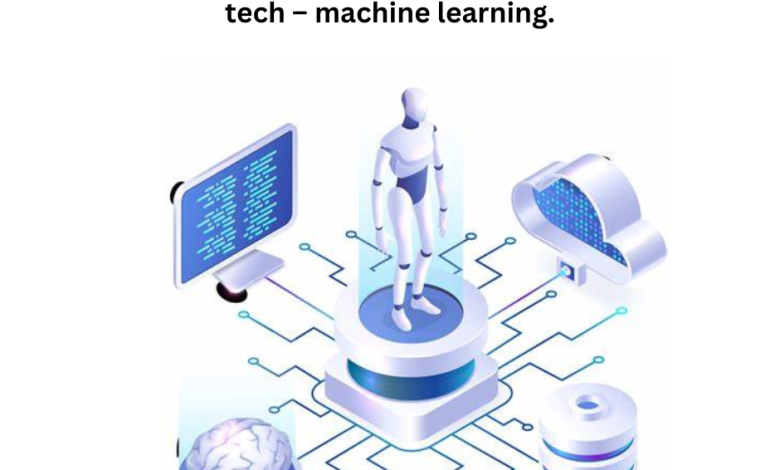Machine Learning Is Expanding Beyond Its Traditional Areas Of Research And Into New Industries.

Introduction
Machine learning is one of the hottest topics in the tech world right now. It’s not just restricted to the world of tech – machine learning is being used in a variety of industries, from healthcare to finance to manufacturing. In this blog post, we’ll take a look at some of the industries where machine learning is making a big impact.
Machine Learning In Healthcare
Machine learning is being used in healthcare to develop predictive models for a variety of applications. These models can be used to improve the accuracy of diagnosis and treatment. Additionally, machine learning can be used to create personalized medicine, which allows doctors to individualize treatments based on a patient’s specific health history.
One of the most promising applications of ML in healthcare is its use to improve the accuracy of diagnosis and treatment. Predictive models can be used to identify potential problems before they become serious, allowing for early intervention and improved patient outcomes. Additionally, ML can be used to create personalized medicine by identifying specific factors that may influence a patient’s health condition. By understanding these factors, doctors are able to provide more targeted treatments that are specifically tailored to their patients’ needs.
Machine learning is also being used to create predictive models for other areas of healthcare. For example, ML can be used to predict how an individual will respond to medication or treatments. This information can help providers make better choices about care for their patients, saving both time and money in the process. In addition, ML can be used to predict patient behavior during medical visits or procedures. By understanding what drives a person’s decision-making process, providers are better positioned to provide optimal care for their patients.
Machine Learning In Finance
Machine learning is used in finance for predictive analytics, risk management, and algorithmic trading. Predictive analytics is a type of ML that uses data to make predictions about the future. This can be used for a variety of purposes, such as forecasting sales or predicting stock prices.
Machine learning can identify patterns in data to make predictions about the future. This can be used for a number of purposes, such as fraud detection or credit scoring. Fraud detection uses ML to identify patterns in financial transactions that may indicate fraud is occurring. Credit scoring uses ML to determine how likely someone is to repay a loan based on their past credit history.
Machine learning can help financial institutions automate processes and make better decisions. For example, it can be used to speed up loan underwriting by identifying similar loans that have been approved previously. It can also be used to improve automated decision making by providing greater insights into complex financial situations.
Machine Learning In Manufacturing
Machine learning is being used in manufacturing to help speed up the process and improve product quality. For example, it can be used to identify defects or problems early on in the manufacturing process, which can save both time and money. Additionally, machine learning can help to optimize processes and produce higher-quality products.
The Machine learning Training in Hyderabad course offered by Analytics path can help you recommend job ready expert in this domain.
There are several different types of ML that can be used in manufacturing. Some examples include support vector machines (SVM), artificial neural networks (ANNs), and genetic algorithms (GA). SVM is a type of ML that uses mathematical models to learn patterns in data. ANNs are composed of interconnected processing units called neurons, which can learn to recognize patterns in data. GA is a type of algorithm that uses Genetic Algorithms to improve the effectiveness of solutions found by other ML algorithms.
Machine learning has proven to be very successful in manufacturing and has helped advance the process significantly. It is expected that this technology will continue to grow in importance as more manufacturers adopt it for their own use.
Machine Learning In Retail
Retailers are using machine learning to improve customer service and target marketing campaigns. For example, banks are using ML algorithms to detect fraud. This helps to improve the efficiency of the banking system and protect customers from fraudulent activities. Stores are also using ML to personalize shopping experience for customers and make recommendations. This allows customers to find products that they may be interested in, as well as reduces the number of times that a customer has to search for a product.
Machine learning is being used to develop new products, optimize pricing, and predict demand. For example, retailers can use ML algorithms to determine what type of product should be produced next, or how much it should cost. Additionally, ML can help retailers optimize their pricing so that they earn the most profit possible from their products. Lastly, ML can also be used to predict how much demand there will be for a particular product before it is sold.
Machine Learning In Logistics
Machine learning is being used more and more in logistics, and for good reason. Logistics is a critical part of any business, and ML can help to optimize it. For example, ML can be used to improve route planning, inventory management, and prediction of demand. Ultimately, using ML in logistics can help to save time and money.
One of the most common uses of ML in logistics is route planning. Route planning is essential for ensuring that products are delivered on time, and that they arrive at their destination in the correct condition. ML can help to optimize a route by identifying potential shortcuts and improving efficiency.
Another area where ML has proved useful is inventory management. Inventory management is critical for businesses of all sizes, and ML can help to identify which items are in high demand and need to be ordered more often. This information can then be used to improve inventory management decisions, reducing costs while ensuring that the right items are available when they’re needed.
In addition to route planning and inventory management, ML can also be used to predict demand. This information can then be used to adjust production plans or order more inventory before it’s needed. By using ML in logistics, businesses can save time and money while ensuring that their products reach their customers in the best possible condition.
Machine Learning In Transportation
Machine learning is being used in transportation to optimize traffic flow, predict maintenance needs, and routing vehicles. Students will learn how ML is being applied in the transportation industry and what benefits it has for this field.
Become a skilled expert in Machine learning with the Analytics Ptah advanced Machine learning Course in Hyderabad
Machine learning has been used in transportation for over a decade to improve efficiency and predict future needs. These include detecting traffic congestion, predicting when maintenance will be required on a fleet of vehicles, and routing the vehicles to their optimal destination.
The applications of ML in transportation are vast and growing every day. It can help reduce traffic congestion, make predictions about upcoming maintenance needs, and optimize routes to ensure the best possible customer experience.
Machine Learning: The New Kid On The Block
Machine learning is a new tool that has recently become popular among students. It is a field of study that involves training computers to learn on their own. This can be done through teaching the computer specific rules or algorithms, and then watching as the computer applies these rules to new data sets.
One of the key benefits of machine learning is that it can be used to predict future events and trends. For example, by predicting how people will respond to different stimuli, ML can help you make better business decisions. Additionally, ML can also help students improve their grades. By using ML tools such as predictive analytics, students are able to identify areas in which they need to improve their academic performance.
Machine learning has a number of potential applications, and it is growing in popularity among students and professionals alike. Some of the most common uses for ML include predicting future events, improving academic performance, and prediction Market trends.
Due to its versatility, ML is becoming increasingly important in fields such as finance, marketing, and healthcare. By using ML tools such as predictive analytics, businesses are able to make better decisions and predict customer behavior. Additionally, by using ML techniques to improve student performance in school, educators can help students reach their full potential.
To Summarize
This article in the Xpert Posting must have given you a clear idea off data science industry.
Machine learning is a rapidly growing field with a vast potential for businesses of all kinds. In this blog post, we’ve looked at some of the industries where ML is making an impact. As you can see, the applications are diverse and the benefits are many. If you’re looking to adopt ML in your business, now is the time to get started.
There are many reasons to be excited about ML. It has the potential to improve efficiency and accuracy in a variety of industries. Additionally, it can help businesses save time and money while providing a better experience for their customers. If you’re considering adopting machine learning in your business, now is the time to get started.





